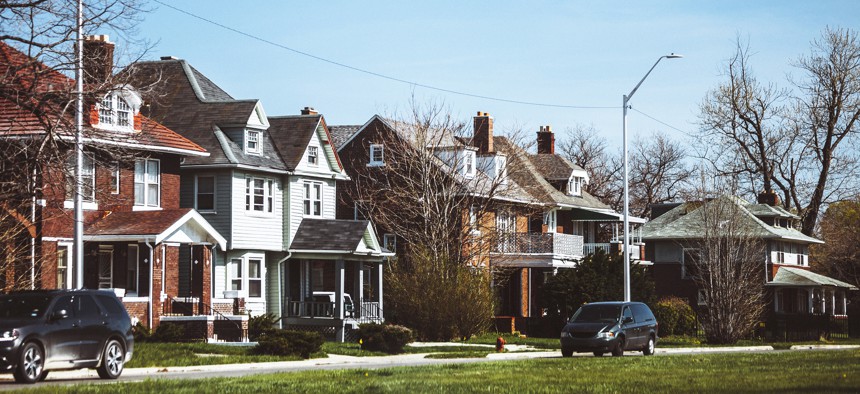One City’s Attempt to Bring Racial Equity to Home Repairs

A neighborhood in east Detroit. peeterv via Getty Images
Established in 2015, Detroit’s zero-interest home repair program has kept hundreds of Black homeowners in their homes.
As the nation continues to confront the affordable housing crisis, there are big questions around how to address housing challenges equitably and sustainably. In Detroit, one such approach is interest-free home repair loans.
Established in 2015, Detroit’s 0% Interest Home Repair Loan Program offers 10-year, interest-free loans from $5,000 to $25,000 to help homeowners make repairs such as replacing windows, removing lead and fixing structural issues. The idea is to help residents—particularly residents of color—not only stay in their homes but also maintain safe homes.
Indeed, while the program requires that applicants live in their homes for at least six months before applying, a large share of applicants has been in their homes for several years, if not decades.
“Building new is not enough,” said Denise Scott, president of the Local Initiatives Support Corporation (LISC), a community development nonprofit. “So our strategy is to build new, preserve what has already been built [and] find ways to keep it affordable.”
Barriers like insufficient collateral or bad credit bar many Detroiters from accessing home improvement capital from private banking institutions, according to LISC. In the years preceding the program’s establishment, 80% of Detroit residents’ applications for loans backed by the Federal Housing Administration (FHA) were denied.
Since Detroit’s 0% Interest Home Repair Loan Program launched, nearly 800 loans have been closed and construction on 682 properties has been completed, according to Damon Thompson, LISC Detroit’s deputy director. That represents a $13.5 million investment in the community, particularly Detroit’s Black community. Thompson notes that 95% of borrowers are Black.
“We really see this as a Black homeownership preservation tool for a really intergenerational wealth-building strategy,” he said.
Programs like these ensure neighborhoods receive the investments they need without pushing families out, added Scott. Racially segregated neighborhoods have been on the rise since the 1990s, she noted, and correlate with underinvestment in neighborhoods of color.
Securing home improvement capital is a challenge for homeowners far beyond the Motor City, according to Laurie Goodman, a fellow for Urban Institute’s Housing Finance Policy Center. Borrowers face many difficulties when it comes to securing federally insured home improvement loans because they come with high bars. For instance, FHA requires borrowers to hire a consultant from the U.S. Department of Housing and Urban Development, or Freddie Mac and Fannie May require lenders to guarantee the loan until the repairs are completed. These stipulations can drive borrowers and lenders away.
“All of these renovation programs—whether it's Freddie, Fannie or FHA—all have a very high denial rate,” she said.
These barriers give institutional investors—with their financial resources and vendor relationships—a leg up in the housing market, allowing them to more easily scoop up properties that would otherwise go to owner-occupants.
Detroit’s program aims to fix that problem. Supported by public and private funds, it has received $7.7 million in full-recourse provisions as well as $1 million in grants from Bank of America since 2015. It has also received a $1 million grant from the Rocket Community Fund and $16 million from the city’s Community Development Block Grant.
Molly Bolan is the assistant editor for Route Fifty.
NEXT STORY: The End Is Near for Outdated Government Financial Reporting






